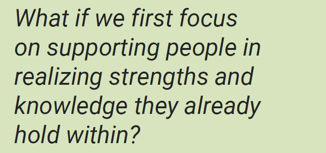Empowered Skills: The Missing Element in Caregiver Training Programs


Last week I talked about the shift to experiential learning and the vast benefits "learning by doing" has to participant-facing training. Now let's discuss a concept called empowered skills.
Notice that I often include education when we are talking about training. You might think these two words are synonymous, but not exactly. So, why do organizations need to consider these two words as separate elements in a caregiver training program?
As we defined earlier, training is teaching a particular skill. In our steps for an effective program, we encouraged you to think beyond skill-building. To educate is to bring forth what is already within.
What if we first focus on supporting people in realizing the strengths and knowledge they already hold within? This is the definition of empowerment. Once a person feels empowered in their role or in the ability to complete a task, continued learning and skill-building becomes more digestible.
One might say that to think about this is to ask if your training program allows caregivers to understand the why behind tasks or a specific action.

In reviewing the benefits of experiential learning, it's safe to say that adding elements of this style supports a shift to ensuring an organization's training program includes a critical piece that is often the missing core element to effectiveness: empowerment.
When we add the education component, or "the why" of experiential learning, we reframe quality measures to evaluate effectiveness.
Here's an easy-to-digest checklist that will help you evaluate your training program's effectiveness and quality:
- Relevant and relatable
- The training program goes beyond checking a box for compliance. Learner feedback is incorporated into content creation and real-life scenarios are included.
- Engaging and interactive
- Experiential components that immerse students in the learning experience are included in the training program. Training leaders facilitate conversation to reinforce learning.
- Impactful and actionable
- The training program connects learning to company goals. The training facilitator engages learners in brainstorming ways to apply what is learned.
- Empowering and educational
- The training program helps learners understand the "why" behind training objectives and skills being taught. Learners are encouraged to ask questions and incorporate their own knowledge during training sessions.
- Practical and comprehensive
- Online, offline, and in-the-moment elements are used to support knowledge that extends beyond the classroom.
In my next blog, I'll review how to evaluate best practices to assess the impact of your education and training program routinely.
.png?width=276&height=272&name=Beige%20Minimalist%20E-book%20Announcement%20Instagram%20Post%20(2).png)


.png)